 Petzlover
Petzlover Bristol is originated from United States but Persian is originated from Iran. Both Bristol and Persian are having almost same weight. Bristol may live 8 years more than Persian. Both Bristol and Persian has same litter size. Bristol requires Low Maintenance. But Persian requires Moderate Maintenance
Bristol is originated from United States but Persian is originated from Iran. Both Bristol and Persian are having almost same weight. Bristol may live 8 years more than Persian. Both Bristol and Persian has same litter size. Bristol requires Low Maintenance. But Persian requires Moderate Maintenance
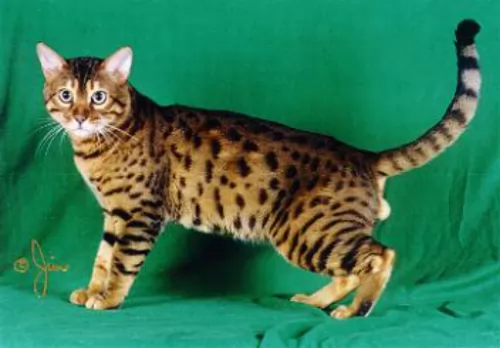 The Bristol cat hails from Texas and was developed during the 1980s, using a south American wild cat and domestic cats.
The Bristol cat hails from Texas and was developed during the 1980s, using a south American wild cat and domestic cats.
The Bristol cat isn’t well-known and in fact, its origins are shrouded in mystery.
The cat was recognized and admitted into the TICA (The International Cat Association. It is looked upon as a hybrid breed or a designer cat.
Nobody seems to know when the first Bristol cat was even bred. Because of its exotic nature, it is believed to be a cross between the American Shorthair and the margay or similar breed.
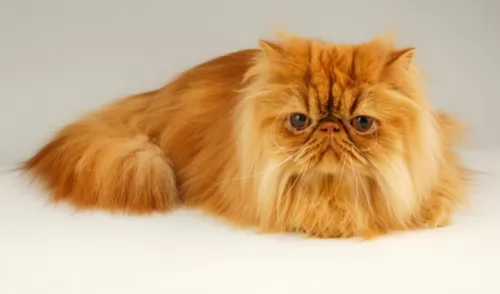 Cat lovers the world over know the Persian cat very well. It's a beautiful long-haired cat breed with its familiar round face and blunt muzzle.
Cat lovers the world over know the Persian cat very well. It's a beautiful long-haired cat breed with its familiar round face and blunt muzzle.
It is not really known when long-haired cats first appeared, or where the Persian originated but their history stems from Persia or Iran as it is known today, where it seems they were first sighted.
The cats were grey-coated and some were white and soon the cats arrived in Britain. They were introduced to the United States in the 1900s. The cat was developed first by the English, and then also by American breeders after the Second World War and the breeding of these cats has also meant a lot of coat colors.
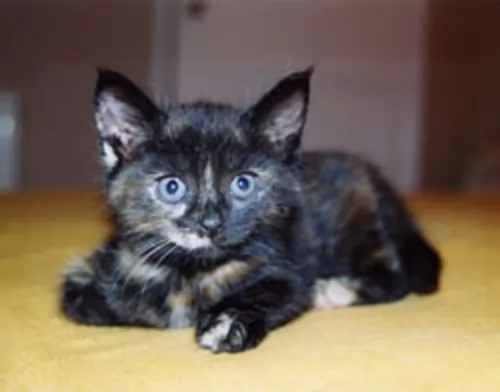 Bristol cats are medium-sized and muscular, powerful cats. They are much like Bengal cats. They have a smokey charcoal appearance while others have quite a bit of white on them.
Bristol cats are medium-sized and muscular, powerful cats. They are much like Bengal cats. They have a smokey charcoal appearance while others have quite a bit of white on them.
They also have rosettes and small rounded ears. The origins of the Bristol breed are uncertain but it seems a multi-colored cat was adopted by a United States Army captain in Australia.
The cat was so adored it was brought back when they returned to the United States. The cat was already pregnant and she gave birth to 2 kittens. The coats are shiny and short-haired with spots and lines of fawn, grey and brown mostly with the eyes being green.
The Bristol cat has a very pleasing disposition – being amicable, playful, and loving. They’re intelligent cats too but they need to spend time in solitude as well.
They definitely don’t respond and bond to everyone in the human family but tend to respond to only one person.
These Bristol cats are cunning and self-confident and because of their wild side, they will need a large area to roam. This is definitely not a cat for city life.
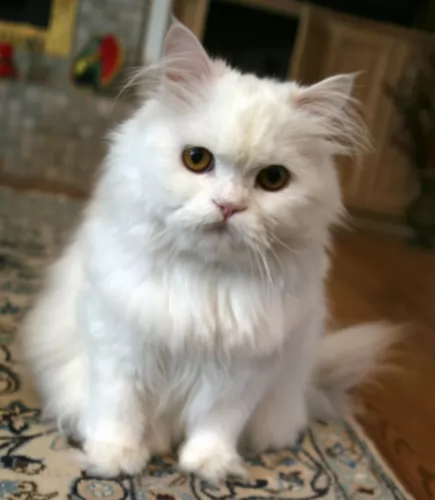 The Persian cat is a medium- to large-sized cat and is heavily boned. He can weigh between 3 and 6kg.
The Persian cat is a medium- to large-sized cat and is heavily boned. He can weigh between 3 and 6kg.
He has stocky legs, a thick neck, small ears, round head, round eyes, and the face is flat or blunt. The kittens are gorgeous balls of fluff.
The coat of the Persian is thick, long, and silky. People many times think only of a white Persian, when in fact the cat comes in many colors and patterns. Eye color for the cat can be blue, green, brown, copper or even odd-eyed.
The Persian isn’t the most active of cats, so attention will need to be given to exercising the cat so as to manage his weight. This cat will also need to have his nutrition controlled to stay in shape and in good health.
Persians enjoy games with their human family and will need some toys to encourage play and exercise.
He is placid and calm but that doesn’t mean he can’t have bursts of energy. They’re quieter than other cats, are sweet-natured, preferring to live in quieter, less boisterous households.
They aren’t loudly vocal but communicate with their eyes and their soft voices. They won’t get on well with small, noisy children but can be loving pets and companions of older children who allow them their own space.
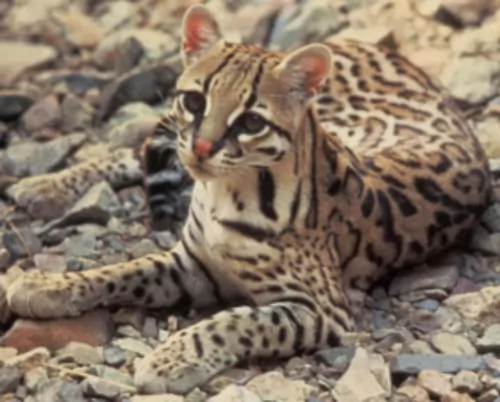 The Bristol cat is beautiful all right, but once again humans should just leave wild cats alone in the bush.
The Bristol cat is beautiful all right, but once again humans should just leave wild cats alone in the bush.
Mixing them with domestic cats doesn’t work in the long run, and many of these cats land up in shelters because of unruly behavior. The Bristol cat is part wild and it doesn’t seem to have a future although there isn’ enough information online to really know what its future is.
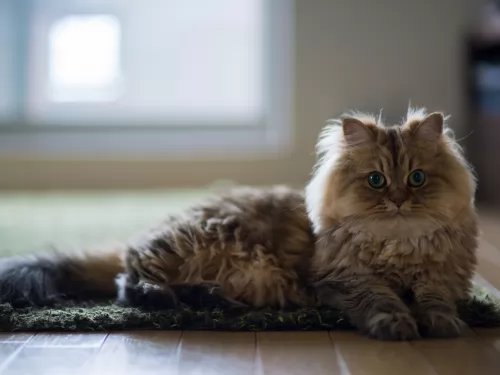 The amicable personality of the Persian cat makes it easy to have these cats in your home. The long hair becomes a bit of an issue as the cat sheds quite a bit.
The amicable personality of the Persian cat makes it easy to have these cats in your home. The long hair becomes a bit of an issue as the cat sheds quite a bit.
They’re sweet, quiet cats and they don’t demand attention from you. They are more than happy just lying quietly in a warm spot. They are calm, loving cats and it's no wonder that they are still such a popular breed of cat.
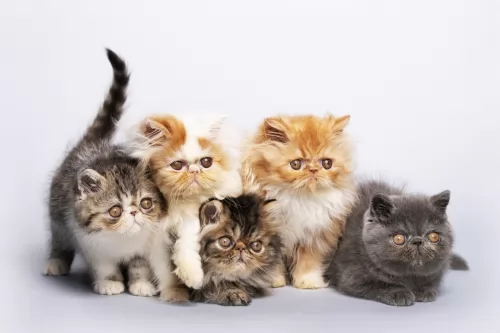 The structure of this cat’s head can mean some health problems. Hereditary Polycystic kidney disease is prevalent with the Persian cat. It is an inherited condition that causes cysts to form in the kidneys. These cysts are actually present from birth, growing larger over time and interfering with kidney function and ending in kidney failure.
The structure of this cat’s head can mean some health problems. Hereditary Polycystic kidney disease is prevalent with the Persian cat. It is an inherited condition that causes cysts to form in the kidneys. These cysts are actually present from birth, growing larger over time and interfering with kidney function and ending in kidney failure.
Also, with a larger breed cat such as the Persian, hip dysplasia is a problem.
Persians are also susceptible to malocclusion which means ‘incorrect bite’. This particular condition can affect the cat’s ability to grasp and actually hold food. So much so in fact, that now pet food manufacturing companies have even developed specially-shaped kibble to cater particularly for the Persian.
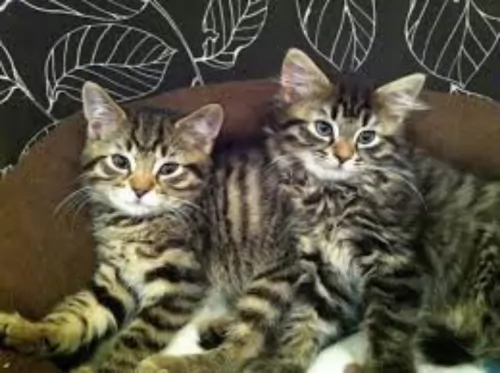 The diet of a cat such as the Bristol will include small rodents, however once domesticated, these cats will need a diet high in protein. The cat is a carnivore and to be healthy it will require high-quality premium commercial cat food that is appropriate for the age of your cat and his health status.
The diet of a cat such as the Bristol will include small rodents, however once domesticated, these cats will need a diet high in protein. The cat is a carnivore and to be healthy it will require high-quality premium commercial cat food that is appropriate for the age of your cat and his health status.
The best cat food has taurine in it, an essential protein that cats can only obtain through quality food. Your adult Bristol cat may prefer eating several smaller meals and this is actually a good idea as smaller frequent meals help towards greater urinary tract health.
If you want a healthy cat, you have to be diligent with providing such a cat with good food that is high in protein. If you aren’t sure, your veterinarian will be able to advise you on what to feed your new cat or kitten.
Factors such as age, size, activity levels, and health make a difference to what you feed your cat, how much and how frequently.
Get into a habit of reading and understanding the labels on the cat food packaging. Certainly, every cat requires taurine, an essential amino acid. You will also need to ensure fresh, cool water day and night.
Always take your pet to the veterinarian if he is lethargic ad disinterested in his food.
Most cats are clean, but you should brush or comb your Bristol cat regularly as the brushing helps keep your cat's coat shiny and also reduces the amount of hair during shedding.
Provide your Bristol cat with a dry, warm sleeping area and keep the bedding clean.
Your Bristol cat needs to wear a safety collar and an ID tag. These ID tags or an implanted microchip can help ensure that your Bristol cat is returned if he becomes lost.
Cats scratch, and cutting your cat’s nails will keep the nails blunt. Nonetheless, to prevent your furniture from being scratched, provide your cat with a strong scratching post covered with a rough material such as sisal or tree bark.
Bristol cats are independent and they don’t require any kind of special care. Certainly, they require large areas for their active lifestyle as well as a shallow pool for swimming.
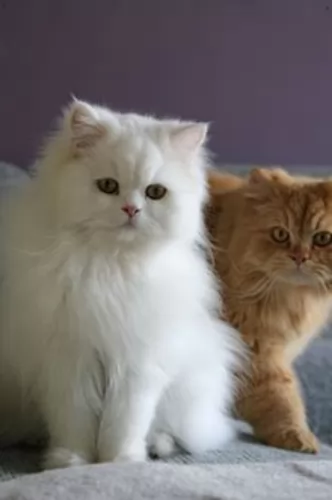 The Persian cat’s coat is long and silky and because he is a fairly heavy shedder, he will require regular brushing – certainly once or twice a week to get rid of that loose hair. It is important to brush and also cut the hair so as to get rid of the tangled knots that form.
The Persian cat’s coat is long and silky and because he is a fairly heavy shedder, he will require regular brushing – certainly once or twice a week to get rid of that loose hair. It is important to brush and also cut the hair so as to get rid of the tangled knots that form.
While brushing your Persian, make sure that his eyes and nose are clear. This is important because the flat face creates problems with these cats.
Excellent cat food for your Persian involves reading labels and understanding what brands are best for your beautiful cat. The Persian cat is a carnivore and will require high-quality food rich in protein.
Speak to your vet if you are in any doubt about the best food for your cat’s health and wellbeing. Make sure your pet has a constant supply of fresh, cool water.
Make sure to keep the litter box clean. Buy a small rake from the pet shop and rake up your cat's feces every single day and dispose of them.